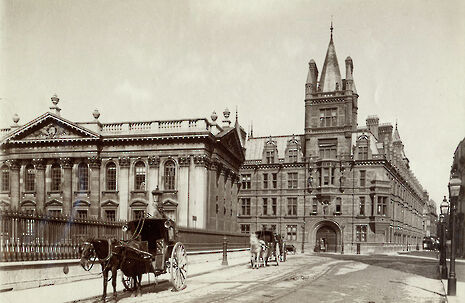The end of class lists: the end of an era?
Class lists wrongly prioritise an outdated tradition at the expense of the individual’s mental health, argues Emily Fishman

I leapt for joy the moment I heard that the University of Cambridge was considering scrapping its traditional class lists. For a second, my current stresses of revision and the looming gloom of exams were magically swept away. Ever since coming to Cambridge, class lists have been something I have resented. When, as a fresher, a third year explained class lists to me, I remember feeling deeply belittled, not to mention rather worried. Exams have always given me a sinking feeling, and during revision I feel as if I am drowning in my own thoughts - not to mention the paper and flash cards. The added stress of class lists only exacerbates my anxiety about exams.
I hate the fact that the university, even in the 21st century, is prepared to preserve an age-old tradition at the cost of student privacy and welfare: even Oxford abandoned them in 2009. It angers me to think how many students who didn't quite make the grade have been deeply embarrassed and publicly shamed. Class lists exist to praise the successful and punish the failures. But this system is truly flawed. The fickle nature of exams and the added stress of Cambridge's entrenched perfectionism makes Easter term in general feel like an ambitious uphill struggle, even without any additional personal pressures we experience as individuals. Of course, we all learn from our own mistakes in the exams - so why should failure be publicly punished?
For students taking a subject which awards a decisive pass or fail, such as vets or medics, these results carry a lot of weight and should not be allowed to be shared openly with the wider student population. With an individual's future riding on a simple pass mark it seems ludicrous to make such a personal and private result available to the public. Class lists for art students perhaps carry less meaning, yet they can still carry the same amount of expectation and dread.
As a History student, seeing my prelim results on show last year was an overwhelming and daunting experience as a first year, even with prelims being in effect 'mock exams'. I remember scanning the list intensively, trying to find my friends and other students. It is always hard not to be curious about how other people did, as we naturally compare our performance to the success or failure of others. With everyone's results freely on show, it proves almost impossible not to look. But class lists state only the results - they do not attempt to show the hard work, compassion, dedication and achievement of the individual student, who is simply another name on a long list.
It seems the list of names and passes tries to simplify the whole exam process. Those looking at the list will forget the tiresome efforts each individual has put in to get that result: the all-nighters in the library, the early morning revision sessions in the University Library, and the dedication to having an alcohol-free term. Names merge into one large group that the university has managed to produce and train as its next generation of graduates. There is no celebration of the process, no story or emotion behind the individual's success; your name becomes just another name, another bright student among many. Your achievements appear nullified and your efforts forgotten in the soulless class list.
It is also important to consider the issue of protecting personal privacy. Of course, in the age before computers, smart-phones and the Internet, posting class lists outside Senate House would have been the easiest way to find out exam results. Nowadays, modern technology renders class lists outdated. As soon as class lists are put up outside Senate House, they are no longer the university's property - with digital technology and 4G Internet speeds they become a victim of the online world and of social media. For someone who has failed, therefore, the punishment extends beyond the white brick wall of Senate House, as results now risk becoming accessible to the world.
This may be the end of an era for class lists; as a university I believe it to be imperative that we move on (as we have from corporal punishment, witchcraft and slavery). Society has changed and technology has progressed further than we could ever have imagined. Of course it is important that Cambridge, as the second-oldest university in the world, upholds and continues its traditions for the betterment of future generations. But, as a world leader and innovator, the university also has a duty to respect and look after the needs of its students, and as such we need to eradicate traditions which no longer work well. Class lists may soon be reduced to a footnote, to be found in history books about the University of Cambridge, but in my view, good riddance.
 News / University Council rescinds University Centre membership20 February 2026
News / University Council rescinds University Centre membership20 February 2026 News / Hundreds of Cambridge academics demand vote on fate of vet course20 February 2026
News / Hundreds of Cambridge academics demand vote on fate of vet course20 February 2026 News / Judge Business School advisor resigns over Epstein and Andrew links18 February 2026
News / Judge Business School advisor resigns over Epstein and Andrew links18 February 2026 News / Caius students fail to pass Pride flag proposal20 February 2026
News / Caius students fail to pass Pride flag proposal20 February 2026 News / Union cancels event with Sri Lankan politician after Tamil societies express ‘profound outrage’20 February 2026
News / Union cancels event with Sri Lankan politician after Tamil societies express ‘profound outrage’20 February 2026









